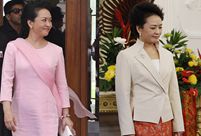 Bikini show in 2014 China Final of Miss Tourism World
Bikini show in 2014 China Final of Miss Tourism World
 Close-up view of August Aerobatic Team
Close-up view of August Aerobatic Team
 Goddesses married in 2014
Goddesses married in 2014
 Polar region photos raise worldwide awareness of global warming
Polar region photos raise worldwide awareness of global warming
 Get off at the last stop — Beijing Subway in vision
Get off at the last stop — Beijing Subway in vision
 Top 100 beauties in the world!
Top 100 beauties in the world!
 Gallery: Who is the most beautiful one?
Gallery: Who is the most beautiful one?
 If you like autumn, put your hands in the air!
If you like autumn, put your hands in the air!
 Fan Bingbing's "Queen style" in new play
Fan Bingbing's "Queen style" in new play
 Lingerie show at 2014 Miss China
Lingerie show at 2014 Miss China
BEIJING, Dec. 16 -- Foreign direct investment (FDI) into the Chinese mainland jumped 22.2 percent in November from a year earlier, settling at 10.36 billion U.S. dollars, the Ministry of Commerce (MOC) said on Tuesday.
Growth quickened from a 1.3-percent rise in October and 1.9 percent in September, as investments into the country's service industry continue rising steadily.
For the first 11 months, the FDI, which excludes investment in the financial sector, stood at 106.24 billion U.S. dollars, up 0.7 percent from the same period last year, the ministry said.
Around 55.1 percent of the FDI went into the country's service sector during the Jan.-Nov. period. FDI into the manufacturing sector moved down 13.3 percent to 35.93 billion U.S. dollars, accounting for 33.8 percent of the total.
Investments from the Republic of Korea and Britain saw fast growth, up 22.9 percent and 28 percent respectively. In contrast, investment from Japan plunged 39.7 percent, followed by a 23.6-percent drop from the ASEAN nations and 22.2-percent slump from the United States.
Tuesday's data also showed China's outbound direct investment by non-financial firms moved down 26.1 percent to 7.92 billion U.S. dollars in November, bringing the total volume in the first 11 months to 89.8 billion U.S. dollars.
MOC spokesman Shen Danyang said the ministry expects the scale of inbound and outbound investments to be "relatively close" this year.
The stronger-than-expected FDI data came as the world's second largest economy is still facing relatively big downward pressures.
Dragged down by a housing slowdown, softening domestic demand and unsteady export, China's growth slid to a low not seen since the 2008/2009 global financial crisis in the third quarter.
In the first three quarters, China's gross domestic output expanded by 7.4 percent.
To support the faltering growth, the central bank last month decided to lower the one-year benchmark lending rate by 40 basis points and the one-year deposit rate by 25 basis points, the first interest rate cuts in more than two years.
The move gave a big boost to the stock market, but with China's deflation risk on the rise, analysts are expecting further easing to invigorate the economy.
Also on Tuesday, the HSBC released the flash manufacturing PMI that showed China's manufacturing activity dropped to a seven-month low in December, which the HSBC chief China economist Qu Hongbin said would warrant further monetary easing in the coming months.
 Beautiful Chinese woman
Beautiful Chinese woman 20 years on: Relocated Three Gorges residents through lens
20 years on: Relocated Three Gorges residents through lens PLA HK Garrison veterans leave behind beautiful smiles
PLA HK Garrison veterans leave behind beautiful smiles Chestnut girl goes viral online
Chestnut girl goes viral online Representative beauties
Representative beauties Victoria's Secret Fashion Show
Victoria's Secret Fashion Show Excellent photos of Zhuhai Air Show
Excellent photos of Zhuhai Air Show In photos: Bright and brave female soldier of PLA
In photos: Bright and brave female soldier of PLA China's charming first lady
China's charming first lady Disrespecting memorial days crosses a line
Disrespecting memorial days crosses a line More efforts needed in ITA talks: experts
More efforts needed in ITA talks: experts China’s burgeoning pageant industry a mess
China’s burgeoning pageant industry a mess South Korean educator brings positivity campaign to China’s Internet
South Korean educator brings positivity campaign to China’s InternetDay|Week|Month